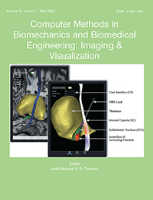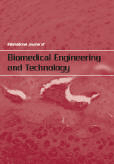
Biomedical Engineering Online
Scope & Guideline
Unlocking the future of healthcare through open-access knowledge.
Introduction
Aims and Scopes
- Biomedical Imaging and Signal Processing:
Research focused on enhancing imaging techniques and developing algorithms for improved diagnostic accuracy, including MRI, ultrasound, and CT imaging. - Tissue Engineering and Regenerative Medicine:
Studies that explore the development of biomaterials and scaffolds for tissue repair and regeneration, including the use of stem cells and growth factors. - Machine Learning and AI Applications:
Utilization of machine learning and artificial intelligence to improve diagnostic processes, predictive modeling, and personalized medicine. - Biomechanics and Rehabilitation Engineering:
Investigations into the mechanics of biological systems and the design of rehabilitation devices to improve patient outcomes in physical therapy. - Wearable and Implantable Technologies:
Development and evaluation of wearable devices and implantable systems that monitor physiological parameters and enhance patient care. - Nanotechnology in Medicine:
Research on the application of nanomaterials and nanoscale techniques for drug delivery, imaging, and diagnostic purposes. - Clinical Applications and Health Informatics:
Studies that integrate engineering solutions with clinical practices to enhance healthcare delivery, including telemedicine and health data management.
Trending and Emerging
- Integration of AI and Machine Learning:
There is a marked increase in studies applying AI and machine learning across various domains, from diagnostics to predictive modeling, indicating a shift towards data-driven healthcare solutions. - Telemedicine and Remote Monitoring:
The rise of telehealth solutions and remote patient monitoring technologies has become a significant focus, especially in light of global health challenges, highlighting the importance of accessible healthcare. - Personalized Medicine and Patient-Centric Approaches:
Emerging research emphasizes personalized treatment strategies that cater to individual patient needs, supported by advancements in genomics and biomarker discovery. - 3D Printing in Healthcare:
The application of 3D printing technology for creating customized medical devices, prosthetics, and even bioprinting tissues is gaining traction, showcasing innovative approaches in biomedical engineering. - Nanomedicine and Targeted Therapies:
There is increasing interest in nanotechnology for drug delivery systems, allowing for targeted treatments that enhance efficacy while minimizing side effects. - Wearable Health Technologies:
The development and application of wearable devices for continuous health monitoring are on the rise, with a focus on real-time data collection and health management.
Declining or Waning
- Conventional Biomechanical Testing:
There appears to be a decline in traditional biomechanical testing studies, as newer methodologies, such as computational modeling and simulations, are increasingly favored. - Basic Materials Science Research:
Research focused solely on the fundamental properties of materials without direct applications in biomedical contexts seems to be declining, with a shift towards applied studies. - Single Modality Imaging Techniques:
The trend is moving away from studies that focus on single imaging modalities, as there is a growing preference for multimodal imaging approaches that provide comprehensive diagnostic insights. - Invasive Surgical Techniques:
There is a noticeable decrease in research focused on invasive surgical methods, as minimally invasive and robotic-assisted techniques gain prominence in clinical practice.
Similar Journals

Nature Biomedical Engineering
Connecting Engineers and Scientists for Global ImpactNature Biomedical Engineering is a premier journal published by NATURE PORTFOLIO, focusing on innovative research at the intersection of engineering and biomedical sciences. With an ISSN of 2157-846X, this journal aims to disseminate groundbreaking studies that advance the field of bioengineering, biotechnology, and medical applications. Since its inception in 2017, it has rapidly earned a reputation for excellence, consistently achieving a Q1 ranking in various categories including Bioengineering and Biomedical Engineering, and receiving acclaim in prestigious Scopus rankings, boasting top positions in the fields of Computer Science Applications and Medicine. The journal operates under a rigorous peer-review process, ensuring that all published articles contribute substantially to the existing body of knowledge. Furthermore, it facilitates a broad accessibility model for researchers and practitioners, bolstering collaboration and innovation within the global scientific community. Nature Biomedical Engineering is not just a publication; it serves as a vital platform for thought leadership in the transformative field of biomedical engineering.

Biomedical Engineering Letters
Unveiling the future of healthcare technology.Biomedical Engineering Letters, published by SpringerNature, is a prominent journal in the field of Biomedical Engineering. With a robust ISSN of 2093-9868 and E-ISSN of 2093-985X, this esteemed journal has established itself as a vital resource for researchers and professionals seeking to advance their knowledge and share groundbreaking findings. Recognized for its quality, Biomedical Engineering Letters holds a distinguished ranking in Scopus, positioned at #94/303 (69th percentile) in the Biomedical Engineering category. The journal covers a diverse scope within biomedical engineering, providing an important platform for innovative research from 2011 to 2024 and facilitating the exchange of ideas among scholars. Although it operates under a subscription model, the journal's commitment to enhancing the field makes it an indispensable reference for those engaged in cutting-edge biomedical research in Germany and globally.

Annual Review of Biomedical Engineering
Bridging Engineering Excellence and Medical AdvancementsAnnual Review of Biomedical Engineering, published by Annual Reviews, stands as a leading academic journal dedicated to the rapidly evolving field of biomedical engineering. With an impressive impact factor that reflects its high citation rates and rigorous peer-review process, this journal offers critical insights by synthesizing cutting-edge advancements and applications in both biomedical engineering and miscellaneous medicine. The journal, which is available in both print (ISSN: 1523-9829) and electronic formats (E-ISSN: 1545-4274), serves as an essential resource for researchers, professionals, and students aiming to stay abreast of significant developments and emerging trends. As of 2023, it is recognized in the top tier (Q1) for both Biomedical Engineering and Medicine, showcasing its esteemed position within the academic community, reflected in its high Scopus rankings. Spanning from 1999 to 2024, the Annual Review of Biomedical Engineering continues to catalyze interdisciplinary collaboration and innovation at the intersection of engineering and healthcare.

Biomedical Engineering-Biomedizinische Technik
Advancing Biomedical Innovation for a Healthier TomorrowBiomedical Engineering-Biomedizinische Technik, published by WALTER DE GRUYTER GMBH, serves as a pivotal platform for advancing knowledge in the field of biomedical engineering and medicine since its inception in 1956. With an ISSN of 0013-5585 and an E-ISSN of 1862-278X, this peer-reviewed journal offers accessible insights into innovative research and technological advancements that are reshaping healthcare practices and biomedical applications. Although rated in the Q3 category for both Biomedical Engineering and Miscellaneous Medicine in 2023, the journal's impact factor and growing reputation demonstrate its vital role in fostering academic dialogue and collaboration. The journal is based in Germany, while its scope encompasses a diverse range of topics, thus bridging the gap between engineering and medical disciplines. Researchers, professionals, and students alike are encouraged to engage with the content that not only highlights contemporary challenges but also presents groundbreaking solutions in biomedical technology.

Biomedical Materials
Bridging Biology and Engineering for Medical Breakthroughs.Biomedical Materials, published by IOP Publishing Ltd, is a premier journal dedicated to the rapidly evolving field of biomedical engineering and materials science. With a robust impact factor showcasing its influence, this journal serves as a vital platform for disseminating pioneering research from 2006 to 2024. Covering an array of interdisciplinary topics—ranging from biomaterials to bioengineering and applied chemistry—the journal consistently ranks in the second quartile across multiple categories including Bioengineering (Q2), Biomaterials (Q2), and Biomedical Engineering (Q2) as of 2023. Researchers, professionals, and students alike benefit from its contributions, exploring innovative solutions at the intersection of biology and material science. Although not an Open Access journal, Biomedical Materials remains essential in advancing our understanding and facilitating discussions surrounding state-of-the-art materials that revolutionize medical applications and enhance patient care.

ANNALS OF BIOMEDICAL ENGINEERING
Transforming biomedical challenges into engineering solutions.ANNALS OF BIOMEDICAL ENGINEERING is a premier journal in the field of biomedical engineering, published by Springer. Established in 1972, this journal has become a vital resource for researchers, professionals, and students engaged in the rapidly evolving domain of biomedical technology. With a commendable impact factor and ranked in the 76th percentile among its peers as per Scopus, it exemplifies excellence in disseminating critical research findings. The journal covers a broad scope of topics related to the integration of engineering principles with medical and biological sciences, facilitating innovations that enhance healthcare outcomes. Although open access is not offered in this journal, it remains an essential platform for scholarly communication, contributing to the continuous advancement of knowledge in biomedical engineering. ANNALS OF BIOMEDICAL ENGINEERING is not only a bridge for academics to share groundbreaking research but also an influential guide for practical applications in medicine and health technologies, making it a fundamental publication for its readership.

Computer Methods in Biomechanics and Biomedical Engineering-Imaging and Visualization
Advancing Imaging Techniques for Biomedical BreakthroughsComputer Methods in Biomechanics and Biomedical Engineering - Imaging and Visualization is a prominent academic journal published by Taylor & Francis Ltd, dedicated to the intersection of computational methods and biomedical engineering. With an ISSN of 2168-1163 and an E-ISSN of 2168-1171, the journal has become a crucial resource for researchers and professionals exploring innovative imaging and visualization techniques in healthcare. Covering a broad spectrum of topics, it aims to facilitate the advancement of knowledge in areas such as biomechanics, computational mechanics, and medical imaging. Holding a strong position in various Scopus rankings, including Q2 in Computational Mechanics, it offers valuable insights that foster interdisciplinary collaboration. Although it is not an open-access journal, researchers can access its rich repository of knowledge, which is instrumental in shaping future advancements in biomedical applications. The journal’s commitment to quality and relevance ensures that it remains an authoritative source for emerging trends and methodologies within the field, serving as a vital tool for academia and industry practitioners alike.

International Journal of Biomedical Engineering and Technology
Empowering Research to Transform Biomedical TechnologiesThe International Journal of Biomedical Engineering and Technology, published by INDERSCIENCE ENTERPRISES LTD, serves as a pivotal platform for the dissemination of innovative research in the field of biomedical engineering. This journal, with ISSN 1752-6418 and E-ISSN 1752-6426, has been a valuable resource since its inception in 2007, boasting a converged publication timeline extending to 2024. Based in the United Kingdom, the journal aims to bridge the gap between engineering and biomedical sciences, facilitating interdisciplinary collaboration. As reflected in its 2023 Scopus ranking in the Q4 quartile of Biomedical Engineering, the journal remains accessible for researchers at various stages of their careers, contributing to its significance in promoting advancements in healthcare technologies. While currently not an open-access publication, the journal remains dedicated to enriching the biomedical engineering community by presenting novel research that addresses critical challenges, ultimately aiming to improve patient outcomes and drive innovation in medical devices and therapies.

Journal of Tissue Engineering and Regenerative Medicine
Transforming healthcare through cutting-edge research in tissue engineering.Journal of Tissue Engineering and Regenerative Medicine, published by WILEY, stands as a pivotal platform in the fields of biomaterials, biomedical engineering, and regenerative medicine. With an ISSN of 1932-6254 and an E-ISSN of 1932-7005, this journal, based in the United Kingdom, has consistently delivered high-quality research since its inception in 2006, converging critical insights through 2024. With an impressive citation profile reflected in its Scopus rankings—specifically a rank of #58 in Medicine and #75 in Biomedical Engineering—the journal is acknowledged for its substantial impact, as demonstrated by its competitive quartile standings in 2023. Notably, it maintains a Q3 ranking in Biomaterials and Q2 in both Biomedical Engineering and Medicine (miscellaneous), showcasing its influence and relevance in the rapidly evolving interplay between engineering and medicine. The journal serves as a vital resource for researchers and practitioners aiming to stay abreast of innovations and breakthroughs in regenerative therapies, tissue scaffolds, and biomaterials. While not an open-access publication, it fosters academic dialogue and knowledge dissemination that is crucial for advancing the field.

International Journal of Biomaterials
Fostering collaboration for breakthrough advancements in biomaterials.The International Journal of Biomaterials, published by HINDAWI LTD, is a premier platform for disseminating groundbreaking research in the fields of biomaterials and biomedical engineering. With an Open Access approach since 2009, this journal provides unhindered access to innovative studies and applications aimed at advancing medical technologies and improving patient outcomes. Notably ranked in the Q3 category for both Biomaterials and Biomedical Engineering in 2023, it serves as an essential resource for researchers, practitioners, and students alike. The journal's Scopus rankings, including a 49th percentile in Biomedical Engineering and a 40th percentile in Biomaterials, further underscore its growing prominence in the academic community. With contributions spanning from 2011 to 2024, the journal seeks to foster collaborative research and promote developments that enhance the understanding and application of biomaterials in healthcare.